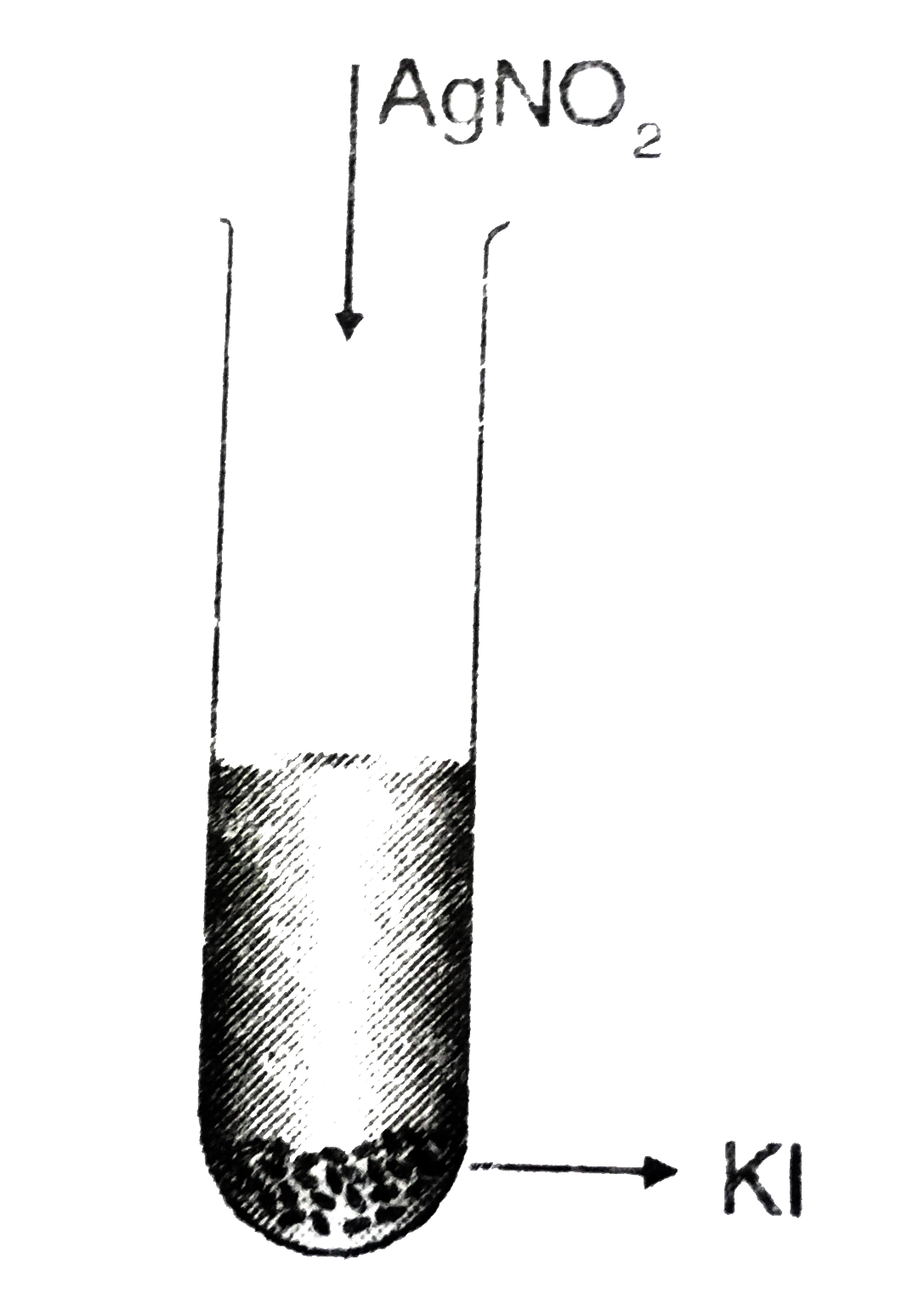Which of the following electrolytes will not be most effective in the coagulation of fold sol?
NaNO3
K4[Fe(CN)6]
Na3PO4
MgCl2
The correct Answer is:A, B, C
To determine which electrolyte will not be the most effective in the coagulation of gold sol, we need to analyze the given options based on their cations and their ability to coagulate negatively charged colloids like gold sol.
1. Understand the Concept of Coagulation:
- Coagulation is the process where colloidal particles aggregate to form larger particles, leading to precipitation. For a negatively charged sol like gold sol, we need a cationic coagulant to neutralize the negative charge.
2. Identify the Given Electrolytes:
- The given electrolytes are:
- NaNO3
- K4FeCN6
- Na3PO4
- MgCl2
3. Determine the Cations of Each Electrolyte:
- For NaNO3, the cation is Na⁺.
- For K4FeCN6, the cation is K⁺.
- For Na3PO4, the cation is Na⁺.
- For MgCl2, the cation is Mg²⁺.
4. Evaluate the Cationic Valency:
- Na⁺ has a valency of 1.
- K⁺ has a valency of 1.
- Mg²⁺ has a valency of 2.
- The cations Na⁺ and K⁺ have lower valency compared to Mg²⁺.
5. Apply Hardy-Schulze Rule:
- According to Hardy-Schulze law, the coagulation power is directly proportional to the valency of the ion. Higher the valency, more effective the coagulation.
- Therefore, Mg²⁺ (valency 2) will be the most effective in coagulating gold sol.
6. Identify the Least Effective Electrolyte:
- Since Mg²⁺ is the most effective, we need to identify which of the other cations (Na⁺ or K⁺) is less effective. Both Na⁺ and K⁺ have the same valency of 1, making them less effective than Mg²⁺.
- Thus, NaNO3 and Na3PO4 (both containing Na⁺) and K4FeCN6 (containing K⁺) will not be as effective as Mg²⁺.
7. Conclusion:
- The question asks for the electrolyte that will not be the most effective in coagulating gold sol. Therefore, the correct answer is any of the options containing Na⁺ or K⁺, as they are less effective compared to Mg²⁺.
Final Answer:
The electrolytes NaNO3, K4FeCN6, and Na3PO4 will not be the most effective in the coagulation of gold sol.
- Coagulation is the process where colloidal particles aggregate to form larger particles, leading to precipitation. For a negatively charged sol like gold sol, we need a cationic coagulant to neutralize the negative charge.
- The given electrolytes are:
- NaNO3
- K4FeCN6
- Na3PO4
- MgCl2
- For NaNO3, the cation is Na⁺.
- For K4FeCN6, the cation is K⁺.
- For Na3PO4, the cation is Na⁺.
- For MgCl2, the cation is Mg²⁺.
- Na⁺ has a valency of 1.
- K⁺ has a valency of 1.
- Mg²⁺ has a valency of 2.
- The cations Na⁺ and K⁺ have lower valency compared to Mg²⁺.
- According to Hardy-Schulze law, the coagulation power is directly proportional to the valency of the ion. Higher the valency, more effective the coagulation.
- Therefore, Mg²⁺ (valency 2) will be the most effective in coagulating gold sol.
- Since Mg²⁺ is the most effective, we need to identify which of the other cations (Na⁺ or K⁺) is less effective. Both Na⁺ and K⁺ have the same valency of 1, making them less effective than Mg²⁺.
- Thus, NaNO3 and Na3PO4 (both containing Na⁺) and K4FeCN6 (containing K⁺) will not be as effective as Mg²⁺.
- The question asks for the electrolyte that will not be the most effective in coagulating gold sol. Therefore, the correct answer is any of the options containing Na⁺ or K⁺, as they are less effective compared to Mg²⁺.
The electrolytes NaNO3, K4FeCN6, and Na3PO4 will not be the most effective in the coagulation of gold sol.
Topper's Solved these Questions
- SURFACE CHEMISTRYBOOK - CENGAGE CHEMISTRY ENGLISHCHAPTER - SURFACE CHEMISTRYEXERCISE - Exercises Single Correct
52 Videos
- SURFACE CHEMISTRYBOOK - CENGAGE CHEMISTRY ENGLISHCHAPTER - SURFACE CHEMISTRYEXERCISE - Single Correct Answer Type
2 Videos
- SURFACE CHEMISTRYBOOK - CENGAGE CHEMISTRY ENGLISHCHAPTER - SURFACE CHEMISTRYEXERCISE - Exercises Link Comprehension
37 Videos
- SOLUTIONSBOOK - CENGAGE CHEMISTRY ENGLISHCHAPTER - SOLUTIONSEXERCISE - Ex 2.3 (Objective)
9 Videos
- SYNTHETIC AND NATURAL POLYMERSBOOK - CENGAGE CHEMISTRY ENGLISHCHAPTER - SYNTHETIC AND NATURAL POLYMERSEXERCISE - Exercises Assertion Reasoning
10 Videos
Similar Questions
Knowledge Check
Select the correct alternative from the choices given:
Which of the following electrolytes is least effective in causing flocculation of positively charged ferric hydroxide sol?AK3[Fe(CN)6]BK2CrO4CK4[Fe(CN)6]DKBr
Answer the following questions :
(i) Which of the following electrolytes is most effective for the coagulation of AgI/Ag+ sol ?
a. MgCl2,K2SO4,K4[Fe(CN)6]
(b) What happens when a freshly precipitated Fe(OH)3 is shaken with a little amount of dilute solution of FeCl3.
(c) Out of sulphur sol and proteins, which one forms macromolecular colloids ?
View SolutionWhich one of the following electrolytes is most effective for the coagulation of Fe(OH)3sol and why?
NaCl,Na2SO4,Na3PO4
View Solution(a) A colloidal sol is prepared by the given method in figure. What is the charge of AgI colloidal particles in the test tube ? How is the sol formed, represented?
 (b) Explain how the phenomenon of adsorption finds application in Heterogeneous catalysis.
(b) Explain how the phenomenon of adsorption finds application in Heterogeneous catalysis.
(c) Which of the following electroytes is the most effective for the coagulation of Fe(OH)3 sol which is a positively charged sol?
NaCI,Na2SO4,Na3PO4
View SolutionWhich of the following ions is most effective in the coagulation of ferric hydroxide solution?
View SolutionWhich of the following will be the least effective in the coagulation of Fe(OH)3 salt ?
View SolutionWhich of the following ielectrolytes is least effective in causing flocculation of ferric hydroxide sol?
View SolutionWhich of the following ielectrolytes is least effective in causing flocculation of ferric hydroxide sol?
View Solution
